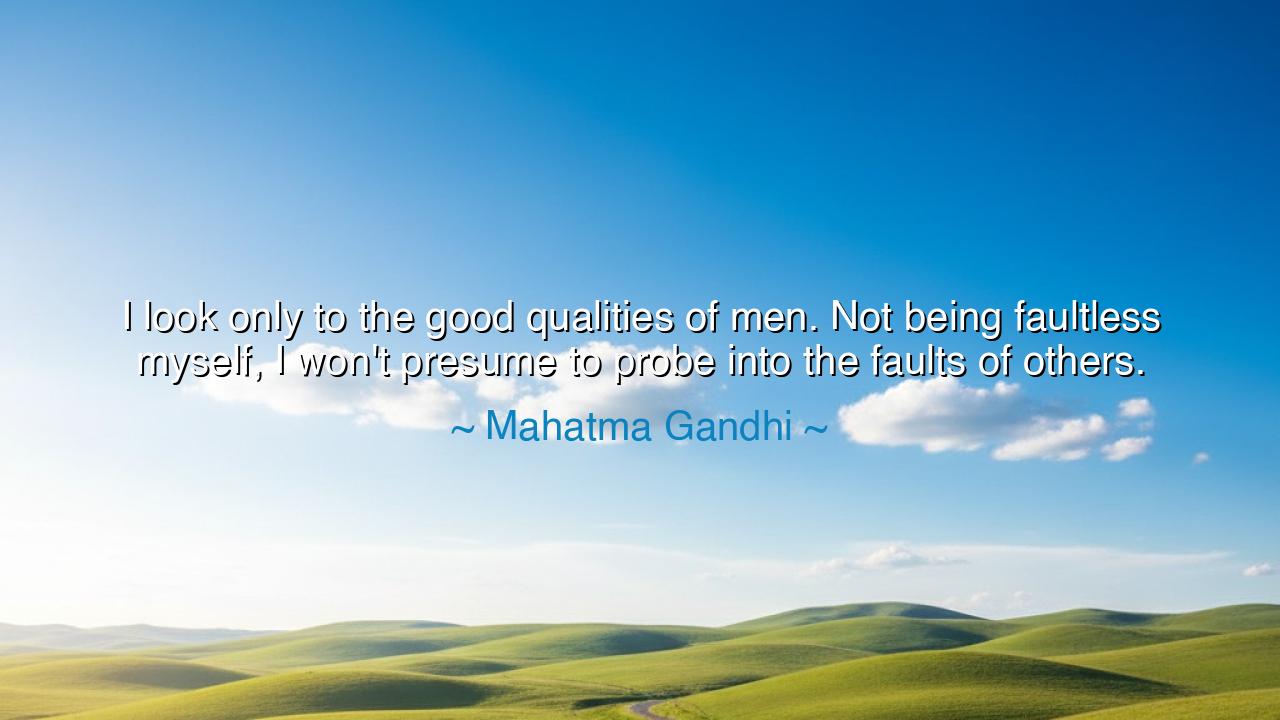
I look only to the good qualities of men. Not being faultless
I look only to the good qualities of men. Not being faultless myself, I won't presume to probe into the faults of others.






Hear the words of Mahatma Gandhi, gentle warrior of truth, who declared: “I look only to the good qualities of men. Not being faultless myself, I won't presume to probe into the faults of others.” In this utterance, the Father of India unveils the path of humility and compassion, a path that shuns the poison of judgment and seeks instead the light within every human soul. For Gandhi knew, as the ancients knew, that man’s greatness is not in magnifying the darkness of others, but in nurturing the sparks of goodness that dwell, however faint, in every heart.
The saying begins with vision: “I look only to the good qualities of men.” To look is not merely to see, but to choose where one’s eyes shall rest. The critic chooses to dwell upon fault, the cynic upon weakness, but the wise man lifts his gaze to virtue. Gandhi speaks here of a discipline of the spirit: to look, not at the stains that mar a garment, but at the beauty of the fabric itself. In this choice lies the secret of harmony, for when we honor another’s strength, we inspire that strength to grow.
Yet Gandhi grounds this vision in humility: “Not being faultless myself.” Here is the heart of wisdom. For who among mortals is without flaw? To judge another harshly is to forget one’s own frailty. Gandhi, though revered by millions, confessed himself a man of imperfection. By acknowledging his own weakness, he freed himself from the arrogance of judgment. This is no mere politeness, but a truth as deep as the ocean: to know oneself flawed is to walk gently among others, never lifting the stone of condemnation too quickly.
History gives us a striking mirror in the life of Abraham Lincoln. During his presidency, when the nation was torn by war, he was urged by many to castigate his enemies with venom. Yet Lincoln often refused. Instead, he said, “Do I not destroy my enemies when I make them my friends?” He, like Gandhi, looked for good qualities, even in those who opposed him. This forbearance, born of humility, became the foundation of reconciliation. His mercy toward the defeated South remains one of the most enduring legacies of his leadership.
The lesson here is clear: the road to peace and unity is not paved by exposing faults, but by lifting virtues. If we fix our gaze only on the failings of others, bitterness multiplies and strife grows. But if we cultivate the discipline of seeing the good, even in the flawed, we call forth nobility where before there was only shame. Every man becomes more of what he is perceived to be; let us then perceive the good, so that it may rise like dawn over the night.
Practical is this counsel. When you meet another—whether friend, stranger, or foe—ask not first, “What is wrong with them?” but instead, “What is right?” Speak praise more quickly than criticism. Offer patience before judgment. And when tempted to probe into faults, look instead within your own heart, and let self-reflection temper your words. In daily life, this practice transforms households, friendships, and even nations, for it replaces accusation with understanding, and resentment with respect.
Therefore, O seeker, take Gandhi’s words as a lamp for your path. Look to the good qualities of men. Acknowledge your own imperfections, and let humility be your companion. Refuse the easy road of fault-finding, and walk instead the harder but nobler path of honoring the light in others. For by lifting up what is good, you help it to grow; by refusing to dwell on what is broken, you give space for healing.
Thus, remember always: greatness is not found in condemning the world for its darkness, but in kindling its hidden light. And he who sees the good in others strengthens the good in himself, until both are lifted together into the dignity of peace.






AAdministratorAdministrator
Welcome, honored guests. Please leave a comment, we will respond soon